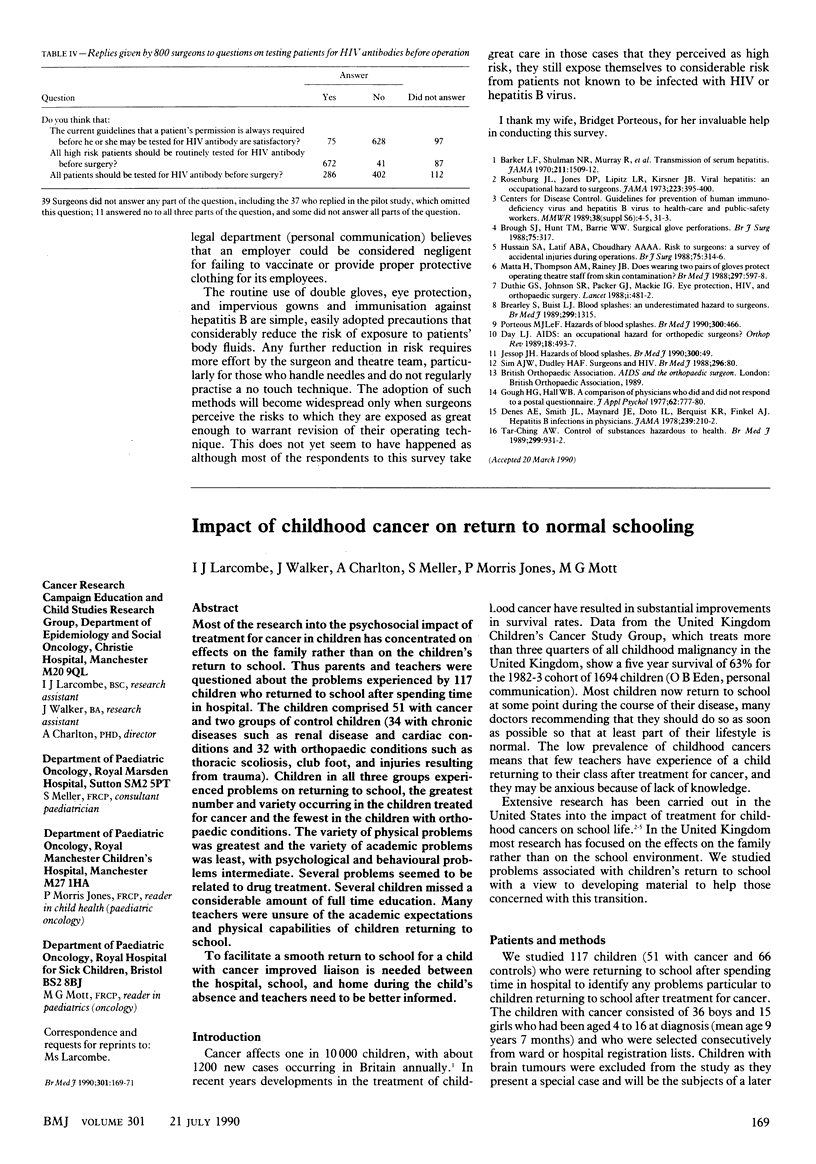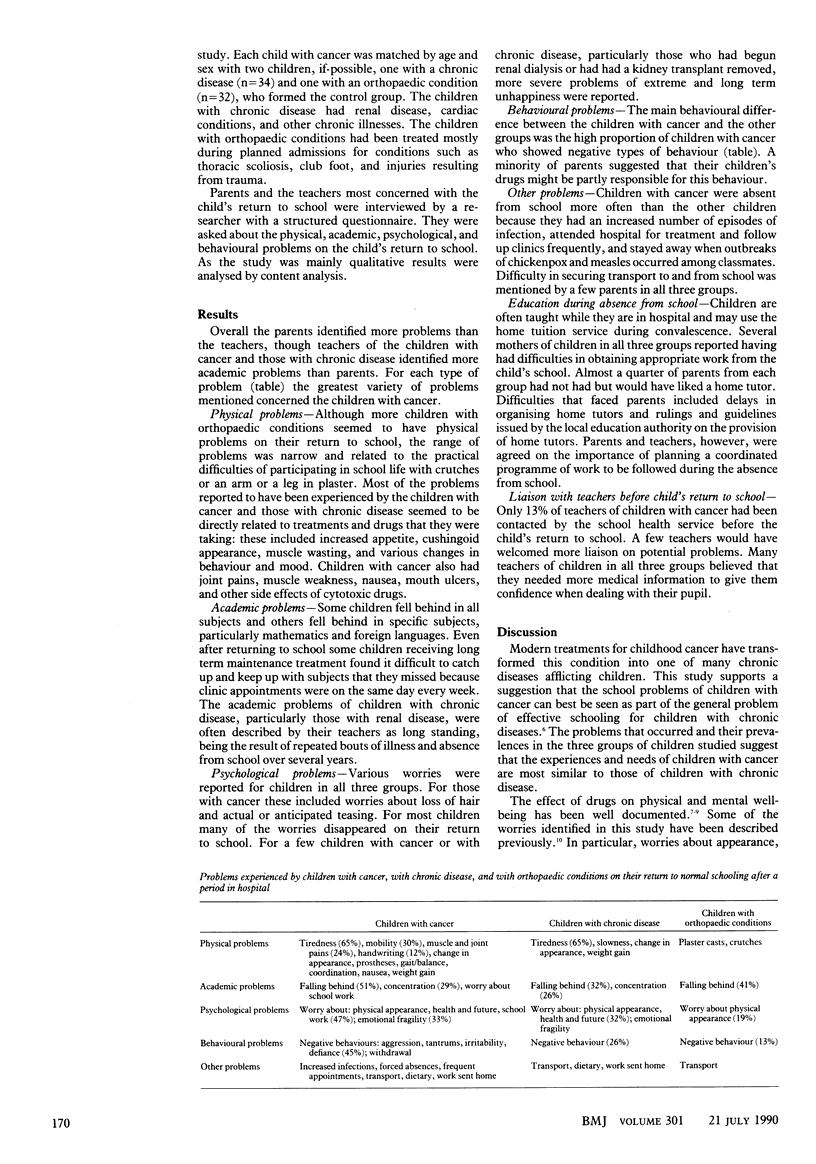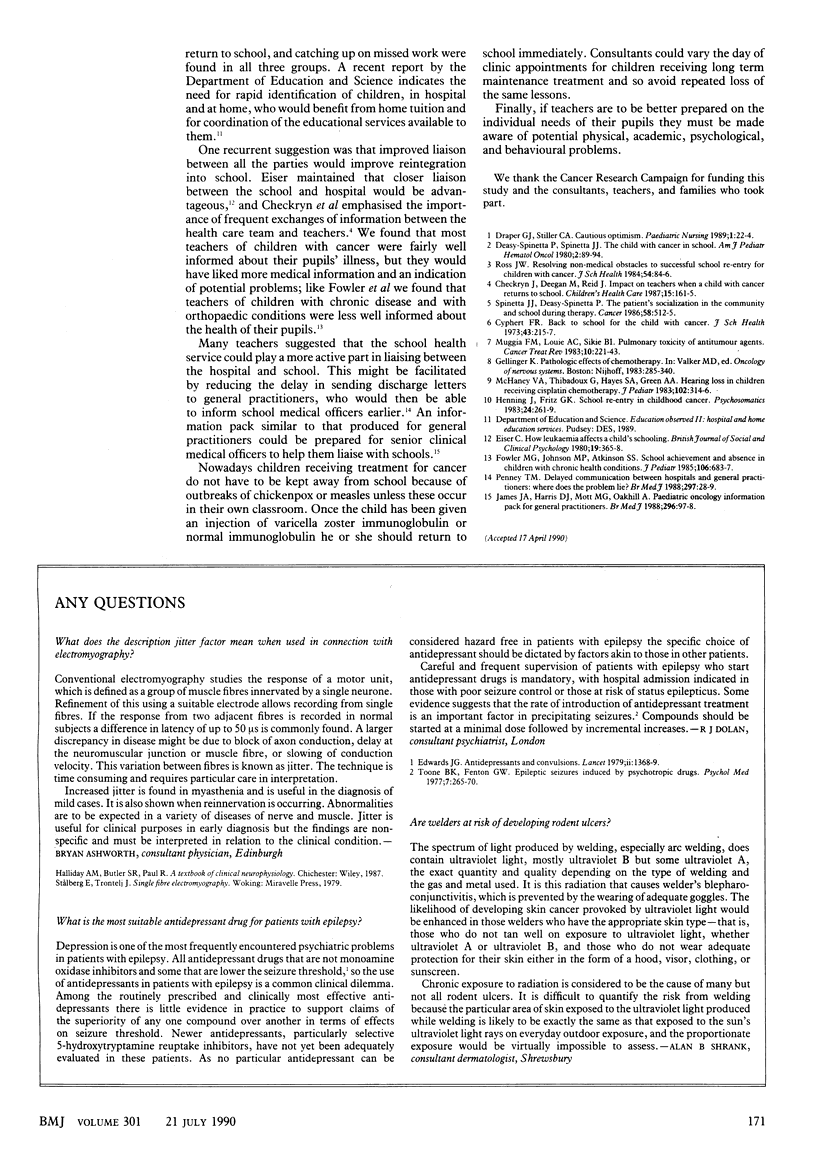Abstract
Most of the research into the psychosocial impact of treatment for cancer in children has concentrated on effects on the family rather than on the children's return to school. Thus parents and teachers were questioned about the problems experienced by 117 children who returned to school after spending time in hospital. The children comprised 51 with cancer and two groups of control children (34 with chronic diseases such as renal disease and cardiac conditions and 32 with orthopaedic conditions such as thoracic scoliosis, club foot, and injuries resulting from trauma). Children in all three groups experienced problems on returning to school, the greatest number and variety occurring in the children treated for cancer and the fewest in the children with orthopaedic conditions. The variety of physical problems was greatest and the variety of academic problems was least, with psychological and behavioural problems intermediate. Several problems seemed to be related to drug treatment. Several children missed a considerable amount of full time education. Many teachers were unsure of the academic expectations and physical capabilities of children returning to school. To facilitate a smooth return to school for a child with cancer improved liaison is needed between the hospital, school, and home during the child's absence and teachers need to be better informed.
Full text
PDF


Selected References
These references are in PubMed. This may not be the complete list of references from this article.
- Cyphert F. R. Back to school for the child with cancer. J Sch Health. 1973 Apr;43(4):215–217. doi: 10.1111/j.1746-1561.1973.tb01876.x. [DOI] [PubMed] [Google Scholar]
- Edwards J. G. Antidepressants and convulsions. Lancet. 1979 Dec 22;2(8156-8157):1368–1369. doi: 10.1016/s0140-6736(79)92852-6. [DOI] [PubMed] [Google Scholar]
- Eiser C. How leukaemia affects a child's schooling. Br J Soc Clin Psychol. 1980 Nov;19(Pt 4):365–368. doi: 10.1111/j.2044-8260.1980.tb00366.x. [DOI] [PubMed] [Google Scholar]
- Fowler M. G., Johnson M. P., Atkinson S. S. School achievement and absence in children with chronic health conditions. J Pediatr. 1985 Apr;106(4):683–687. doi: 10.1016/s0022-3476(85)80103-7. [DOI] [PubMed] [Google Scholar]
- Henning J., Fritz G. K. School reentry in childhood cancer. Psychosomatics. 1983 Mar;24(3):261–269. doi: 10.1016/S0033-3182(83)73228-7. [DOI] [PubMed] [Google Scholar]
- McHaney V. A., Thibadoux G., Hayes F. A., Green A. A. Hearing loss in children receiving cisplatin chemotherapy. J Pediatr. 1983 Feb;102(2):314–317. doi: 10.1016/s0022-3476(83)80551-4. [DOI] [PubMed] [Google Scholar]
- Muggia F. M., Louie A. C., Sikic B. I. Pulmonary toxicity of antitumor agents. Cancer Treat Rev. 1983 Dec;10(4):221–243. doi: 10.1016/0305-7372(83)90012-9. [DOI] [PubMed] [Google Scholar]
- Penney T. M. Delayed communication between hospitals and general practitioners: where does the problem lie? BMJ. 1988 Jul 2;297(6640):28–29. doi: 10.1136/bmj.297.6640.28-a. [DOI] [PMC free article] [PubMed] [Google Scholar]
- Ross J. W. Resolving nonmedical obstacles to successful school reentry for children with cancer. J Sch Health. 1984 Feb;54(2):84–86. doi: 10.1111/j.1746-1561.1984.tb08772.x. [DOI] [PubMed] [Google Scholar]
- Spinetta J. J., Deasy-Spinetta P. The patient's socialization in the community and school during therapy. Cancer. 1986 Jul 15;58(2 Suppl):512–515. doi: 10.1002/1097-0142(19860715)58:2+<512::aid-cncr2820581316>3.0.co;2-s. [DOI] [PubMed] [Google Scholar]
- Toone B. K., Fenton G. W. Epileptic seizures induced by psychotropic drugs. Psychol Med. 1977 May;7(2):265–270. doi: 10.1017/s0033291700029354. [DOI] [PubMed] [Google Scholar]


